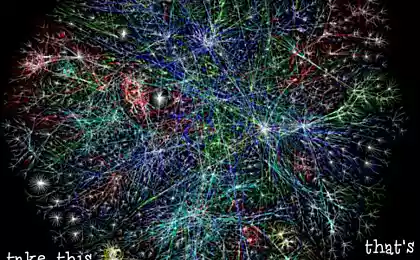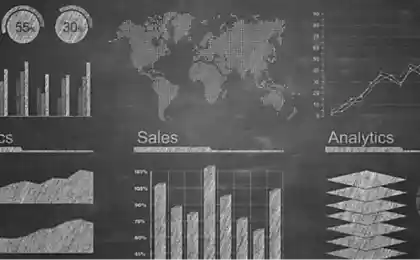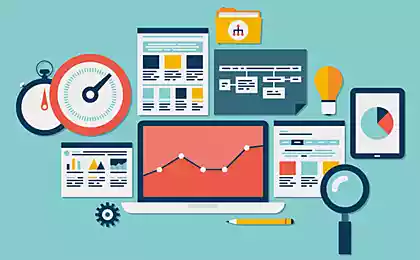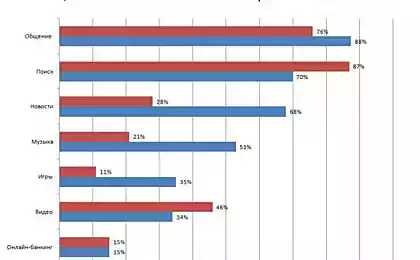630
10 ways in which technology is changing your life for the worse
The benefits of modern technology, know everything. But every coin has a reverse side. This is especially true of technologies that we use on a daily basis. They are, oddly enough, is able to influence our habits and personalities – and very surprising ways.
1. The effect of the echo chamber
Ninety eight million six hundred eight thousand two hundred seventy three
You may think that social media are an effective tool of solving conflicts between people who have different points of view. However, this is not true. For example, the algorithms used by Facebook, provide users with only those materials that are consistent with their interests, which is quite logical. However, these materials are designed to reinforce their existing opinions and beliefs, which is very problematic.
As a result, users of social media need to find a point of view different from their own, but most of them, of course, do not.
This effect is meant to reinforce separation and divisions between different groups. The interaction between them, as a rule, occurs only in the form of conflict. This phenomenon is known as "bubble filters». Because of him, in front of people who get their news mainly from social media seldom shows promise.
2. Technology and the problem of obesity
Twenty two million six hundred sixty six thousand ninety six
Increase in the level of obesity in the world, various factors have contributed, including modern technology. Ubiquitous smartphones, tablets, TVs and game consoles played in the role that we began to lead a sedentary lifestyle.
In a large-scale study Melinskogo Institute scientists analyzed the obesity rate in 27 countries and came to the conclusion that its increase is inextricably linked with the development of technology. They nail us to the sofas, we become less active and also dramatically change your eating habits.
In some countries, government and employers introduce special programs (free advice on weight loss and providing memberships at health centers) in order to counteract this effect.
3. The Internet has a negative impact on the concentration
Twenty three million four hundred thirty five thousand eight hundred thirty eight
It is unlikely You will be surprised by the fact that excessive consumption of digital media has led to a sharp decrease in concentration. Canadian researchers conducted a study with the financial support of the company "Microsoft". Using detailed surveys and EEG twice they measured the level of concentration from 2000 volunteers: for the first time in 2000, which is considered the beginning of the mobile era, the second – in 2015.
Result: the average attention span for fifteen years decreased from 12 to 8 seconds – exactly half. It is even less than the average goldfish. But the report notes that our ability to efficiently multitask has increased.
4. The Internet has made us less patient
Sixty three million eight hundred sixty one thousand nine hundred thirty five
The growing popularity of YouTube and streaming video has led to the emergence of culture, representatives of which are not ready to wait long for anything, especially if we are talking about entertainment. Scientists at the University of Massachusetts at Amherst conducted the study, during which studied the habits of more than six million Internet users to find out, how long the average user will wait for video upload.
Result: no more than two seconds; after this amount of time, users began to leave the page with the video in droves.
Similar is observed in real life. More and more large retailers began to offer urgent delivery of "day to day". Furthermore, it is now more commonplace as the mobile app for booking tables in restaurants and call a taxi.
Scientists from the Pew Research center conducted a study which analyzed the life "giperbolicheskikh" adults under age 35 years. They concluded that excessive Internet usage can have negative consequences in real life, which include "the need for immediate gratification of desires and the loss of patience".
5. GPS affects the functioning of the brain
Sixty five million eight hundred forty seven thousand six hundred eighty two
GPS technology has become an integral part of our daily life. However, scientists from McGill University conducted three studies, the results of which showed that excessive hope on the GPS is able with age to impair our long-term memory. And all because the hippocampus, the brain area that controls memory, is also relevant to spatial navigation.
Scientists discovered the increase in the volume of gray matter and increased activity in the hippocampus in people who have not used GPS devices and relying heavily on spatial navigation. One neuroscientist involved in the study even suggested that GPS technology may lead to earlier onset of dementia. In addition, the rejection of them is able to prevent cognitive impairment.
6. Active use of technology leads to a decrease in creative thinking
Ninety eight million one hundred twenty three thousand four hundred twenty four
Many people think that the abundance of information and online resources in General contribute to the development of creative thinking. However, as the results of scientific research, far from it. Johns Hopkins scientists and University of Illinois recently conducted a study which examined the effect of abundance on human creativity. They found that the large number of web resources actually leads to a decrease in creative thinking.
When resources are limited, people more creative approach to their use. In the study, researchers found momentum, which they called "thinking in conditions of limited" (a mental process arising out of deficit). With the accessibility of fewer resources people tend to adopt more creative solutions to achieve the desired result.
The report also notes that while, since 1990, the level of creative thinking is declining steadily, performance IQ, on the contrary, grow. Both effects are most pronounced in the groups of children aged from 5 to 10 years.
7. Smartphones can affect Your sleep mode
One million three hundred forty six thousand seven hundred eighty six
In 2012, the U.S. Time magazine conducted a survey among the 4,700 participants, which revealed that most of them were agree with the statement "I have trouble sleeping because I never leave electronic devices". Among respondents aged 18 to 24 years, is recognized only one quarter. However, there are scientifically based reasons, why smartphone use in the evening can negatively affect Your sleep.
People know when to sleep and Wake up, the quality of ambient light (this is a built in natural mechanism). The "red" light (the one we see in twilight) signals the body that need to go to bed, blue light – it's time to Wake up. This "blue" color are typical for the morning hours; it also radiate smartphones and tablets. It is known to suppress the production of melatonin, a hormone regulator of circadian rhythms. According to a study conducted by Harvard scientists, blue light also reduces REM sleep, which is crucial for the stable functioning of the human psyche.
8. Text messages have a negative impact on our ability to chat live
Twenty eight million seven hundred ten thousand nine hundred forty four
Text messages have become one of the main ways of communication in the modern world. Even those people who belong to older age groups, today sent SMSes more often than make phone calls. Everybody knows that communicate with text messages and e-mails is restricted but the problem is not only this.
The results of new studies show that text messaging is gradually deprives us of the ability to recognize emotional cues that are an important component of the conversation. Some psychologists expressed strong concern that the lack of such experience can have a devastating impact on the social development of young people. Most adults entered the mobile era, already having generated a set of social skills, which is not true of children and adolescents. They are more limited in their abilities to conduct and maintain a conversation face to face, unlike previous generations.
9. Because of the possibilities of Google less You use your memory
Fifty one million seven hundred seventy eight thousand two hundred fifty eight
Practical any information You can obtain with the help of Google instant search, that is both useful and problematic. According to scientists from Harvard and Wisconsin universities, this has led to the emergence of the so-called "Google effect" – the tendency to regard the Internet as something like a hard drive for our brain, allowing us to remember less information.
Users start thinking that the Internet is part of their own cognitive process, not a tool of getting knowledge, so they tend less to use your memory to consolidate new information.
10. Fake news and misinformation
Twenty one million six hundred forty two thousand four hundred fifty six
Fake news sites which is very difficult to distinguish from the real thing, constantly come under fire from critics for publishing misleading information or outright lies in the pursuit of clicks.
In 2015, scientists from Stanford University conducted a study which assessed the ability of pupils and College students to determine the accuracy of the information on the Internet. 80 percent of its members are unable to distinguish between a normal article from the ads marked "sponsored content", which was located on the same page.
Also interesting: Neurolinguist Tatiana Chernigovskaya: How the Internet affects our brain
Wi-Fi passwords airports around the world on one map
In another study, only 25 percent of the subjects were able to determine that his proposed Twitter account news site Fox News was a fake. Researcher Sam Weinberg said: "Despite the fact that modern students are actively using social media, many of them not familiar with the basic criteria for evaluating the reliability of the information". published
P. S. And remember, just changing your mind — together we change the world! ©
Source: muz4in.net/news/10_sposobov_pri_pomoshhi_kotorykh_tekhnologii_menjajut_vashu_zhizn_v_khudshuju_storonu/2016-12-12-42494
1. The effect of the echo chamber
Ninety eight million six hundred eight thousand two hundred seventy three
You may think that social media are an effective tool of solving conflicts between people who have different points of view. However, this is not true. For example, the algorithms used by Facebook, provide users with only those materials that are consistent with their interests, which is quite logical. However, these materials are designed to reinforce their existing opinions and beliefs, which is very problematic.
As a result, users of social media need to find a point of view different from their own, but most of them, of course, do not.
This effect is meant to reinforce separation and divisions between different groups. The interaction between them, as a rule, occurs only in the form of conflict. This phenomenon is known as "bubble filters». Because of him, in front of people who get their news mainly from social media seldom shows promise.
2. Technology and the problem of obesity
Twenty two million six hundred sixty six thousand ninety six
Increase in the level of obesity in the world, various factors have contributed, including modern technology. Ubiquitous smartphones, tablets, TVs and game consoles played in the role that we began to lead a sedentary lifestyle.
In a large-scale study Melinskogo Institute scientists analyzed the obesity rate in 27 countries and came to the conclusion that its increase is inextricably linked with the development of technology. They nail us to the sofas, we become less active and also dramatically change your eating habits.
In some countries, government and employers introduce special programs (free advice on weight loss and providing memberships at health centers) in order to counteract this effect.
3. The Internet has a negative impact on the concentration
Twenty three million four hundred thirty five thousand eight hundred thirty eight
It is unlikely You will be surprised by the fact that excessive consumption of digital media has led to a sharp decrease in concentration. Canadian researchers conducted a study with the financial support of the company "Microsoft". Using detailed surveys and EEG twice they measured the level of concentration from 2000 volunteers: for the first time in 2000, which is considered the beginning of the mobile era, the second – in 2015.
Result: the average attention span for fifteen years decreased from 12 to 8 seconds – exactly half. It is even less than the average goldfish. But the report notes that our ability to efficiently multitask has increased.
4. The Internet has made us less patient
Sixty three million eight hundred sixty one thousand nine hundred thirty five
The growing popularity of YouTube and streaming video has led to the emergence of culture, representatives of which are not ready to wait long for anything, especially if we are talking about entertainment. Scientists at the University of Massachusetts at Amherst conducted the study, during which studied the habits of more than six million Internet users to find out, how long the average user will wait for video upload.
Result: no more than two seconds; after this amount of time, users began to leave the page with the video in droves.
Similar is observed in real life. More and more large retailers began to offer urgent delivery of "day to day". Furthermore, it is now more commonplace as the mobile app for booking tables in restaurants and call a taxi.
Scientists from the Pew Research center conducted a study which analyzed the life "giperbolicheskikh" adults under age 35 years. They concluded that excessive Internet usage can have negative consequences in real life, which include "the need for immediate gratification of desires and the loss of patience".
5. GPS affects the functioning of the brain
Sixty five million eight hundred forty seven thousand six hundred eighty two
GPS technology has become an integral part of our daily life. However, scientists from McGill University conducted three studies, the results of which showed that excessive hope on the GPS is able with age to impair our long-term memory. And all because the hippocampus, the brain area that controls memory, is also relevant to spatial navigation.
Scientists discovered the increase in the volume of gray matter and increased activity in the hippocampus in people who have not used GPS devices and relying heavily on spatial navigation. One neuroscientist involved in the study even suggested that GPS technology may lead to earlier onset of dementia. In addition, the rejection of them is able to prevent cognitive impairment.
6. Active use of technology leads to a decrease in creative thinking
Ninety eight million one hundred twenty three thousand four hundred twenty four
Many people think that the abundance of information and online resources in General contribute to the development of creative thinking. However, as the results of scientific research, far from it. Johns Hopkins scientists and University of Illinois recently conducted a study which examined the effect of abundance on human creativity. They found that the large number of web resources actually leads to a decrease in creative thinking.
When resources are limited, people more creative approach to their use. In the study, researchers found momentum, which they called "thinking in conditions of limited" (a mental process arising out of deficit). With the accessibility of fewer resources people tend to adopt more creative solutions to achieve the desired result.
The report also notes that while, since 1990, the level of creative thinking is declining steadily, performance IQ, on the contrary, grow. Both effects are most pronounced in the groups of children aged from 5 to 10 years.
7. Smartphones can affect Your sleep mode
One million three hundred forty six thousand seven hundred eighty six
In 2012, the U.S. Time magazine conducted a survey among the 4,700 participants, which revealed that most of them were agree with the statement "I have trouble sleeping because I never leave electronic devices". Among respondents aged 18 to 24 years, is recognized only one quarter. However, there are scientifically based reasons, why smartphone use in the evening can negatively affect Your sleep.
People know when to sleep and Wake up, the quality of ambient light (this is a built in natural mechanism). The "red" light (the one we see in twilight) signals the body that need to go to bed, blue light – it's time to Wake up. This "blue" color are typical for the morning hours; it also radiate smartphones and tablets. It is known to suppress the production of melatonin, a hormone regulator of circadian rhythms. According to a study conducted by Harvard scientists, blue light also reduces REM sleep, which is crucial for the stable functioning of the human psyche.
8. Text messages have a negative impact on our ability to chat live
Twenty eight million seven hundred ten thousand nine hundred forty four
Text messages have become one of the main ways of communication in the modern world. Even those people who belong to older age groups, today sent SMSes more often than make phone calls. Everybody knows that communicate with text messages and e-mails is restricted but the problem is not only this.
The results of new studies show that text messaging is gradually deprives us of the ability to recognize emotional cues that are an important component of the conversation. Some psychologists expressed strong concern that the lack of such experience can have a devastating impact on the social development of young people. Most adults entered the mobile era, already having generated a set of social skills, which is not true of children and adolescents. They are more limited in their abilities to conduct and maintain a conversation face to face, unlike previous generations.
9. Because of the possibilities of Google less You use your memory
Fifty one million seven hundred seventy eight thousand two hundred fifty eight
Practical any information You can obtain with the help of Google instant search, that is both useful and problematic. According to scientists from Harvard and Wisconsin universities, this has led to the emergence of the so-called "Google effect" – the tendency to regard the Internet as something like a hard drive for our brain, allowing us to remember less information.
Users start thinking that the Internet is part of their own cognitive process, not a tool of getting knowledge, so they tend less to use your memory to consolidate new information.
10. Fake news and misinformation
Twenty one million six hundred forty two thousand four hundred fifty six
Fake news sites which is very difficult to distinguish from the real thing, constantly come under fire from critics for publishing misleading information or outright lies in the pursuit of clicks.
In 2015, scientists from Stanford University conducted a study which assessed the ability of pupils and College students to determine the accuracy of the information on the Internet. 80 percent of its members are unable to distinguish between a normal article from the ads marked "sponsored content", which was located on the same page.
Also interesting: Neurolinguist Tatiana Chernigovskaya: How the Internet affects our brain
Wi-Fi passwords airports around the world on one map
In another study, only 25 percent of the subjects were able to determine that his proposed Twitter account news site Fox News was a fake. Researcher Sam Weinberg said: "Despite the fact that modern students are actively using social media, many of them not familiar with the basic criteria for evaluating the reliability of the information". published
P. S. And remember, just changing your mind — together we change the world! ©
Source: muz4in.net/news/10_sposobov_pri_pomoshhi_kotorykh_tekhnologii_menjajut_vashu_zhizn_v_khudshuju_storonu/2016-12-12-42494























